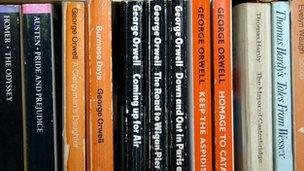Penguin Books moves into self-publishing
- Published

Penguin Books has bought one of the biggest self-publishing companies, ASI, for 拢116m
The parent company of Penguin Books, Pearson, has bought one of the biggest self-publishing companies, Author Solutions Inc (ASI).
The $116m (拢74m) deal is a big step by Penguin Books into the rapidly expanding self-publishing industry.
Penguin said the deal gave it a leading position in a sector that has entered the mainstream in the past three years.
But some have criticised the buy-out, with one authors' body saying it could threaten the rights of new writers.
The growth of e-book readers and tablet computers has prompted a change in the route taken by authors, with increasing numbers choosing to bypass traditional publishers and release and market their own titles.
Some 150,000 writers have published their work through ASI since it was established in 2007.
In 2011, 211,000 titles were self-published in either print or digital form - an increase of almost 60 percent on the previous year.
EL James' erotic novel, Fifty Shades of Grey, which became the first book to sell more than one million copies on Amazon's Kindle e-reading device, began as a self-published title.
'Misleading'
Penguin chief executive, John Makinson, said that buying Author Solutions "will allow Penguin to participate fully in perhaps the fastest-growing area of the publishing economy and gain skills in customer acquisition and data analytics that will be vital to our future".
But Deputy General Secretary of The Society of Authors, Kate Pool, said the deal is "misleading" to budding writers.
"Companies like those in the ASI stable claim to be self-publishing but are not," she claimed.
"The author pays for certain services but in return the work is generally produced only as print-on-demand and the author is obliged to give the company exclusive rights, and will be paid only a royalty.
"Our concern is that ASI companies are very misleading to aspiring authors. They are not self-publishing, nor are they proper publishers - though the apparent endorsement of the Penguin/Pearson brand may lead some authors to think they are," she added.
Philip Jones, deputy editor of The Bookseller said it is "absolutely right" that Penguin is tapping into the self publishing market.
"This is where writers are," he said, adding "they have recognised a gap in the market in indie publishing.
"They are not buying a franchise, they are buying an infrastructure company. There's nothing retrograde about this decision to buy [ASI]."
With access to an additional 1,600 members of staff, Penguin's takeover of ASI will provide it with the additional resources to forge ahead with plans to digitize its back catalogue of 16,000 titles within two years.
Changing industry
Mick Rooney from The Independent Publishing Magazine said he has "no doubt" there will more deals like the one between Pearson and ASI.
"Publishing - and what it once meant and how it's executed - is changing in process, as well as the myriad of developing e-markets.
"I'd say the difference now is that the responsibility is squarely on the shoulders of the author to ensure money flows to the author through the decisions he or she takes," he said.
"Traditional publishing and self-publishing are both risks - the personal and financial value is learning how to wager those risks sensibly," he added.
ASI's chief executive Kevin Weiss said the company was "thrilled to join Penguin to accelerate the pace of change in the industry".
ASI has 1,600 employees based in the US and Philippines, and generated revenues of about $100 million in 2011.
Penguin said ASI would be integrated into Penguin's back office, but would continue to run as a separate business.
- Published27 February 2012
- Published28 June 2012
- Published18 April 2011
- Published30 July 2010